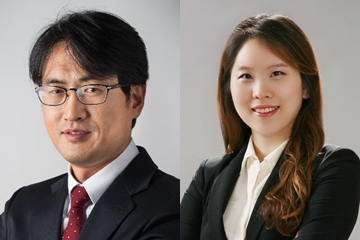On the Bar is a regular column written by attorneys at Yoon & Yang LLC on various laws and regulations that affect running a business in Korea. The content provided here is general legal information. -- Ed.
The Labor Standards Act uses the concept of “ordinary wages” as an instrument to compute allowances for overtime work and work on holidays, among other things.
Although the act does not explicitly define ordinary wages, since 1988 the Ministry of Employment and Labor has interpreted the term to mean “fixed wages that are set to be paid regularly and on a flat basis within one wage payment term (1 month).” Bonuses paid out for payment periods exceeding one month have not been recognized as ordinary wages.
 |
Kim Young-min (left) and Jenny JH Kim |
The Supreme Court’s view was in line with that of the Labor Ministry until 1996, when the court ruled that wages paid for payment periods exceeding one month could be considered ordinary wages. Its 1996 decision did not attract much attention, but its later decision on March 29, 2012, in the Kuma Limousine case -- that regular bonuses paid for payment periods exceeding one month could constitute ordinary wages -- triggered a litigation boom.
A landmark en banc decision was rendered by the Supreme Court on Dec. 18, 2013, meaning the case was heard before the entire bench rather than a panel of judges. That decision laid out the legal standard for the concept of ordinary wages and the criteria for a payment to be considered as such.
Specifically, the court confirmed that payments made for payment periods exceeding one month could be considered ordinary wages so long as they were made regularly, making it clear that regular bonuses fell within the definition.
At the same time, the court recognized an exception, saying additional payments could be refused under the “principle of good faith” in cases where the additional financial obligation would result in material hardship for the company or threaten its existence.
Since then there has been ongoing debate as to the scope of applicability of the so-called “good-faith exception.” Also, another point of dispute has been whether regular bonuses -- which are paid only to incumbent employees and therefore may not be seen as “fixed” -- may constitute ordinary wages.
Recent lower court rulings concerning Hyundai Motor and Kia Motors highlight how the “fixedness” element could significantly impact the court’s determination of a corporation’s liability to its employees in suits over ordinary wages.
Welfare points, which some companies include as part of their benefit packages, also became the center of some disputes. Beneficiaries pointed out that these noncurrency welfare points are highly limited in their range of use and should therefore be differentiated from cash payment.
Fourteen members of the National Assembly from the ruling Democratic Party submitted a bill on June 29 that would amend the Labor Standards Act so that bonuses paid each month and fringe benefits paid in cash would be considered part of a worker’s ordinary wages. These payments are already included as part of the minimum wage under the Minimum Wage Act, pursuant to its recent amendment.
Lower court decisions are divided on these questions. The Supreme Court is reviewing the matter so that similar cases can be handled uniformly.
Almost five years have passed since the en banc decision on ordinary wages was rendered. Though the major issues have been resolved to some extent, the controversy has not died down.
When a lawsuit is brought regarding ordinary wages, most companies tend to bring up the good-faith exception, arguing that the exception applies in their cases.
But the good-faith exception is recognized only in limited instances concerning regular bonus payments, and it is immensely difficult to predict what stance the court will take in particular cases, especially when the question of how to determine those exceptional cases remains so unclear.
Therefore, it is necessary for companies to consider undertaking an overall reform of the wage payment structure and to reduce working hours so as to minimize the burdens they will have to bear as a result of the expansion of the concept of ordinary wages.
It would also be beneficial to keep an eye on the movement of politicians and the government, as they might try to resolve the ordinary wage issue through legislative means.
 |
(Herald DB) |
By Kim Young-min, Jenny JH Kim
Kim Young-min is an attorney and partner at the law firm, Yoon & Yang LLC, mainly practicing in the areas of labor and corporate issues.
Jenny JH Kim is a foreign attorney at the law firm, Yoon & Yang LLC, for international and corporate issues.









